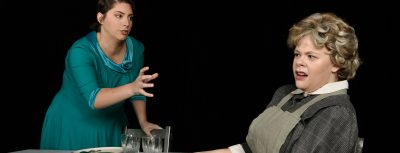Stetson’s Second Stage Presents Expressionist Drama ‘Machinal’

Stetson Theatre Arts major Cori Lapinsky realizes audiences may not emphasize with her character in the Second Stage production of “Machinal.” After all, her character, identified simply as Young Woman, is a murderess.
And, says director Julie Schmitt, the man she kills – her husband – “is a nice guy.”

“That’s the difficulty of it,” Lapinsky said. “I really have to portray to the audience how she is perceiving the situations she’s in, rather than their perception of her reaction to it.”
“Machinal,” a 1928 expressionist play by American journalist and playwright Sophie Treadwell, was inspired by the real-life case of Ruth Snyder, a woman convicted of murdering her husband and sentenced to die by electric chair. The Second Stage production runs Thursday, Feb. 22, through Sunday, Feb. 25, in the theatre at the Museum of Art – DeLand.
“I need the audience to recognize that, say, I’m anxious every time Mr. Jones touches me because I don’t want him to touch me, rather than think ‘Why did she just flinch? He just put his hand on her shoulder,’ ” Lapinsky said. “So, there is a challenge in that.
“But she’s so obviously so uncomfortable for so much of the play, and everyone around her either doesn’t see it or they ignore it, and they think she’s an anomaly.”
Young Woman’s alienation is one of the aspects that lands Treadwell’s play in the expressionist genre, along with such American works as Eugene O’Neill’s “The Hairy Ape” and “The Emperor Jones,” and Elmer Rice’s “The Adding Machine.”

“Expressionism examined feelings of alienation we were having in the early 20th century,” said Schmitt, associate professor and director of Theatre Arts. Those feelings were spurred by “industrialization and the impact of World War I, this mass killing on such a global scale, and the machinery to create weapons of war.
“There was a real sense within the arts community of how we might be able to use art to tap into those feelings of being alone in a crowd, of the conformity of people who almost become a cog in the machine because ‘I’m doing the same repetitive task over and over.’
“Sophie Treadwell became unique in this movement because she added gender to that. For a woman, if there’s a real sense of a pre-scripted role for you, what happens when you aren’t fitting into that particular narrative? What happens when you are constantly pushing back at expectations because ‘I maybe don’t want to get married. I maybe don’t want to have kids. I don’t want to fit into this particular mode.’”
Another characteristic of expressionism is that “the audience to a degree is asked to enter into the mind of the protagonist and to see all of the characters through that particular perspective,” Schmitt said. “What you normally would see dramatized, Treadwell has decided not to dramatize.”
In “Machinal” (an archaic term that means “of or relating to machines”), Young Woman gets married to her boss, but the wedding is not depicted. Neither do audiences see the birth of her child – only her anxieties afterward. Nor does the audience see the murder of her husband — only the trial after the murder.
“You can get carried away with the action of a scene, so instead Treadwell has tried to dramatize her anxieties,” Schmitt said. “I hope in dramatizing those and how close she is to the brink of madness, because of the social pressure on her to behave a certain way, that you feel some empathy or some understanding for why this character would quote-unquote snap in this way, or would commit what really is a cold-blooded murder.”

Lapinsky, a 22-year-old Daytona Beach native, chose “Machinal” as her senior project, and with good reason: She can relate to the lead character’s feelings of alienation.
“I’m a lesbian and I came out of the closest only after I got to college,” she said. She felt “excluded from society growing up because you don’t fit in and you don’t understand why. So that drew me to this show a lot. My research involves specifically what a queer woman but also all members of the LGBT community go through in life just to be able to know themselves.
“This play just spoke to me a lot in that aspect – she (her character) feels very trapped and I recognized that feeling,” she said.
Both Lapinsky and Schmitt see the current #MeToo movement, in which women are speaking out about sexual abuse and harassment they had previously silently endured, reflected in this 90-year-old play.
“The first episode in the play frames it that her soon-to-be husband is her boss,” Schmitt said. “And it’s said at a couple of points that he’s attracted to her. If she doesn’t respond to him, she’ll lose her job.”
Young Woman, Lapinsky said, “has a moment where she thinks, ‘Should I marry him? No worry, no work, I’ll be free.’ But she wouldn’t be free because she would still be under his control. He’s still the dominant one in the relationship.”
“Audiences can’t help but see this is not a fairy tale story,” Schmitt said. “This is not ‘She got swept off her feet by the boss,’ which is such a trope in so many plays — the secretary gets noticed by her boss and now she’s going to lead this life of leisure. The playwright does such a sensational job of dismantling that kind of fairy tale.”
The cast of “Machinal” also includes: Christian Christensen as Husband, James Robinson as Man and Morgan Egan as Mother. The ensemble includes Noah Belachew, Aliya Cruise, Lynxh Cruz, Anders Hammerstrom, Cooper Hendrix, Elijah McCoy, Daniel Mejia, Kiara Santiago and Anieska Wojcik.
— Rick de Yampert
If You Go
Stetson’s Second Stage Theatre presents “Machinal” at 8 p.m. Thursday, Feb. 22, through Saturday, Feb. 24, and at 3 p.m. Sunday, Feb. 25, at its venue inside the Museum of Art – DeLand, 600 N. Woodland Blvd., DeLand.
Admission is $12 adults and $10 seniors and non-Stetson students; free for Stetson students, faculty and staff with valid ID. Tickets will be available at the door. For information or reservations, call the Second Stage box office at 386-822-8700. Reserved tickets must be picked up 30 minutes prior to show time.



